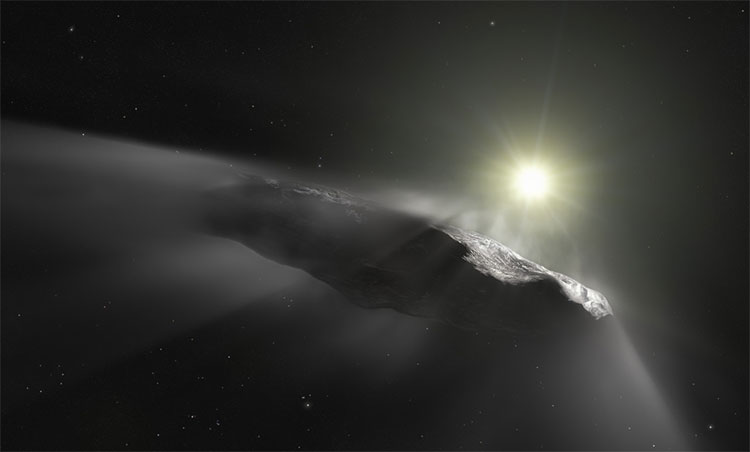Comets and asteroids sprinkle life across the galaxy?
Is the extra-terrestrial bacterium a source? Are we really creatures born from Earth?
Probably not. A group of Harvard researchers believe that all of us can be migratory creatures from outer space, to Earth through a mechanism called panspermia .
As often as biologists still explain, life on Earth originates from the Earth. Science fiction is not tied to that argument.'Prometheus' or 'Alien' movies, for example, are plot-based films that suggest that our planet is being cultivated by alien creatures.
In the movie, aliens use some sort of advanced technology to get to Earth. Paranormal theory does not require such a high technique, but based on the basic idea as follows: A shooting star bumps into a living planet and that collision plunges into the universe of rocks containing micro creature. These clumps of rocks eventually hit another world and transmitted to it the life it brought.
Many argue that panspermia may be true within the solar system. For example, it is possible that life started on Mars more than 4 billion years ago and thanks to panspermia, that life came to Earth, where the germ of life developed and as we see it now. now on.

Oumuamua asteroid.
But for a long time people still gave the preaching of the world just a limited range. Even though microorganisms have a stronger vitality, 'tougher' than cheap steaks, they are unlikely to survive a long interstellar journey.
When they reach the new place, they are dead, radioactive in the universe destroyed and lack of water on the way. The opportunity for a piece of soil containing bacteria from one star system to actually reach a planet in another stellar system is only as small as the chance to shoot a earth pigeon thousands of billions of miles away.
changed these judgments. Last year, when it passed through our solar system, scientists at Harvard University found that large objects could sprinkle life through a long journey of light years, even throughout. whole galaxy.
They think it is possible, because there are many ways to speed up 'biological sprouts' up to a much greater speed and get gravity by another star system when it approaches, and finally colliding with a planet and leaving that germ alive.
This game of catching germs has the best chance of a binary star system. About half of the stars in the Milky Way have companion stars and gravity fields in these star systems are always changing. Sometimes they launch asteroids, comets or even moons or planets into space at great speed. The binary star systems are also very good at attracting large objects to themselves as they pass through each other.
By mathematical calculations, the researchers concluded that there may be many groups of asteroids, comets, moons and planets that are 'abandoned' and float in the galaxy. They can travel through interstellar distances far apart for millions of years. It may be a long journey, but there are still some bacteria that survive.
If this scenario is true, instead of identifying our ancestors as Bosnians or Bengali, we must rethink that our true ancestors are from an 'unknown' planet . It can also be understood that life exists everywhere in the universe.
But it is still unclear whether life can travel through such a trip. Scientist Rocco Mancinelli works for NASA as one of the skeptics that bacteria can survive such pioneering pilgrimage.
He said: ' If the trip lasts for millions of years, it will die and there is no meaning no matter if it is the same life-like germ on Earth. It will be destroyed by radiation in the universe. And even if it can survive, radiation emitted from the mineral itself in the rock that carries it will also kill it. "
Besides such skeptical opinions, there are still many people who believe in panspermism. Perhaps they believe that because they are not completely satisfied with the idea that our ancient ancestors were hole-eaters, the idea that we have a civilized origin seems more interesting. a lot of. If humans are not born by the gods, at least we can be descendants of creatures from a very, very distant planet
- The giant comet piece can wipe out life on Earth
- Small planets, comets near Earth in 2013
- Comets bring life materials to Earth
- Software to predict the harmful effects of meteors
- The plan deflects asteroids that threaten the Earth
- Thousands of bombs threaten the life of the earth
- Controversy about life on comet 67P
- Extremely special comets will appear in 2013
- Philae detected the signs of life on comets
- The Earth suffers from dozens of collisions with asteroids
- NASA discovered 72 asteroids that could collide with the Earth
- Simple tips to help chase ants
 Van Allen's belt and evidence that the Apollo 11 mission to the Moon was myth
Van Allen's belt and evidence that the Apollo 11 mission to the Moon was myth The levels of civilization in the universe (Kardashev scale)
The levels of civilization in the universe (Kardashev scale) Today Mars, the sun and the Earth are aligned
Today Mars, the sun and the Earth are aligned The Amazon owner announced a secret plan to build a space base for thousands of people
The Amazon owner announced a secret plan to build a space base for thousands of people